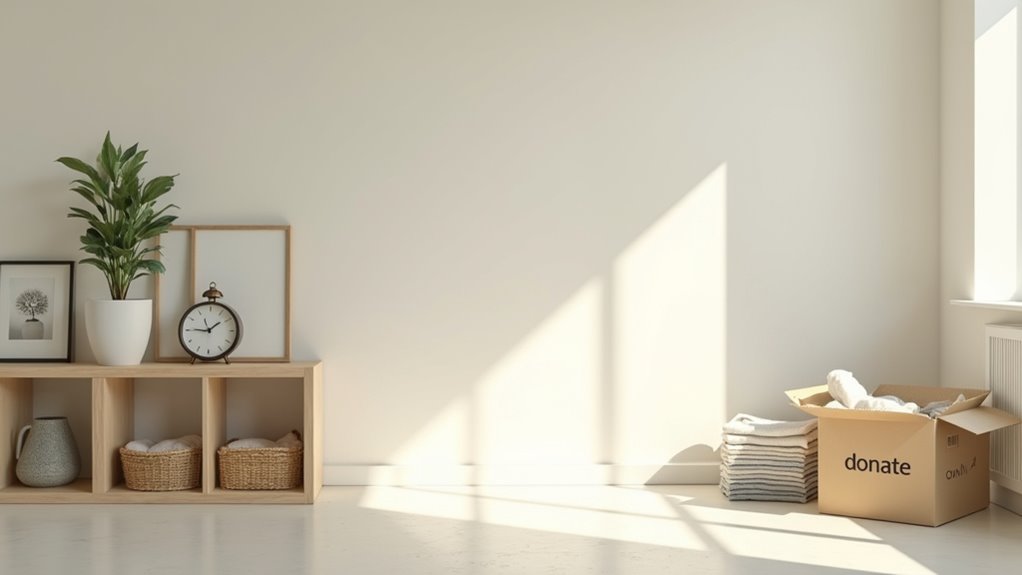The 30-Day Decluttering Challenge is a structured, achievable way to transform your home and mind. Each day, you'll tackle a specific area, completing tasks in just 10 to 20 minutes. It helps reduce stress, improves focus, and boosts your mood as you celebrate small victories. You'll learn to maintain an organized space, making decluttering a regular habit. Keep going, and you'll discover even more tips to enhance your journey toward a clutter-free life.
Key Takeaways
- The challenge consists of daily tasks that take only 10 to 20 minutes, making it manageable to complete.
- Focus on one specific area each day to prevent overwhelm and encourage progress.
- Create a donation zone to simplify the decision-making process for decluttering items.
- Celebrate small victories and milestones to maintain motivation throughout the month.
- Incorporate regular maintenance routines to sustain an organized space after the challenge ends.
Understanding the Benefits of Decluttering

When you take the time to declutter your space, you're not just tidying up; you're also unlocking a host of psychological, environmental, social, economic, and long-term benefits.
Decluttering reduces stress and anxiety, creating a calm atmosphere that fosters better focus and productivity. You'll find that a cleaner environment boosts your creativity, allowing ideas to flow more freely. Plus, achieving a clutter-free space enhances your self-esteem, giving you a sense of accomplishment. Additionally, engaging in household work encompasses both mental and emotional tasks, making the decluttering process a holistic approach to self-care. This practice aligns with the Law of Attraction principles, emphasizing how positive changes in your environment can lead to positive shifts in your mindset.
Decluttering fosters a serene environment, enhances creativity, and boosts self-esteem through the satisfaction of a tidy space.
Environmentally, you'll promote sustainable habits, reduce waste, and support local charities through donations.
Economically, decluttering saves you money by minimizing new purchases and increasing property value.
In the long run, these efforts develop habits that foster mindfulness and improve your overall well-being.
How the 30-Day Decluttering Challenge Works

The 30-Day Decluttering Challenge offers a structured and manageable approach to transforming your space. Over 30 days, you'll focus on one specific task each day, tackling areas like kitchen countertops and closets. Each task is designed to be completed in just 10 to 20 minutes, helping you stay focused without feeling overwhelmed. You can adjust the schedule if needed, ensuring flexibility for missed days. The challenge encourages creating donation stations and using organizing tools like boxes and bins. Additionally, adopting a cohesive palette can enhance the overall aesthetic of your space as you declutter. Plus, you can benefit from digital resources for guidance. Frequent decluttering is essential to prevent overwhelming feelings and makes the process easier over time.
Daily Tasks Breakdown
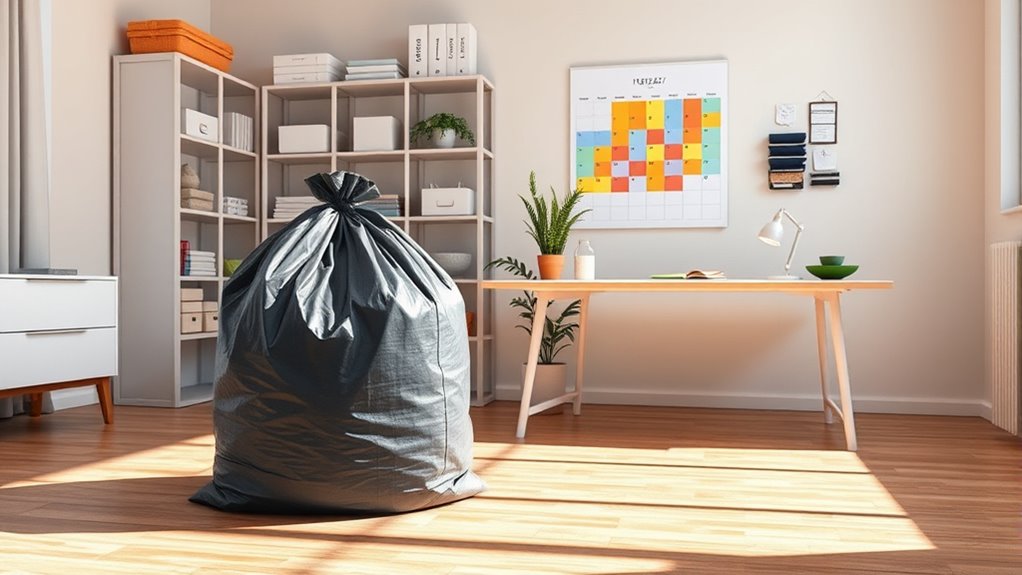
To kick off your decluttering journey, each day presents a focused task designed to make the process manageable and effective.
In the first week, you'll identify clutter hotspots and prepare a donation zone, then tackle wallets and kitchen surfaces. Clutter contributes to stress and anxiety, which makes it essential to address these areas early on. Acknowledging these feelings can facilitate emotional healing during the decluttering process.
By week two, you'll organize your pantry and bathroom toiletries, followed by decluttering beneath the kitchen sink.
Moving into week three, clear out closets and digital devices, then tidy your living room and sock drawer.
In the final week, sort through paper clutter and tidy your car.
You'll finish strong by organizing your linen closet and outdoor spaces.
Finally, celebrate your accomplishments and plan to maintain your newly organized environment with a nightly reset.
Key Areas to Focus on During Decluttering

Which areas of your home tend to accumulate the most clutter?
Start with the kitchen and dining areas; clear out your pantry, cabinets, and drawers. Get rid of unused gadgets and organize your dining space for functionality. Regular decluttering in these spaces is essential for maintaining order and efficiency.
Begin with the kitchen and dining areas; declutter your pantry, cabinets, and drawers for a more functional space.
Next, tackle entryways and mudrooms by decluttering shoes, jackets, and accessories. Use bins for keys and mail, and install hooks for hanging items.
Move to personal spaces like bedrooms and closets. Sort your clothing to keep what you love and donate the rest.
In the living room, declutter shelves and coffee tables, and organize electronics.
Finally, address garages and basements by categorizing tools and decorations, using shelving units, and labeling bins.
Regular maintenance keeps clutter at bay!
Tips for a Successful Decluttering Journey
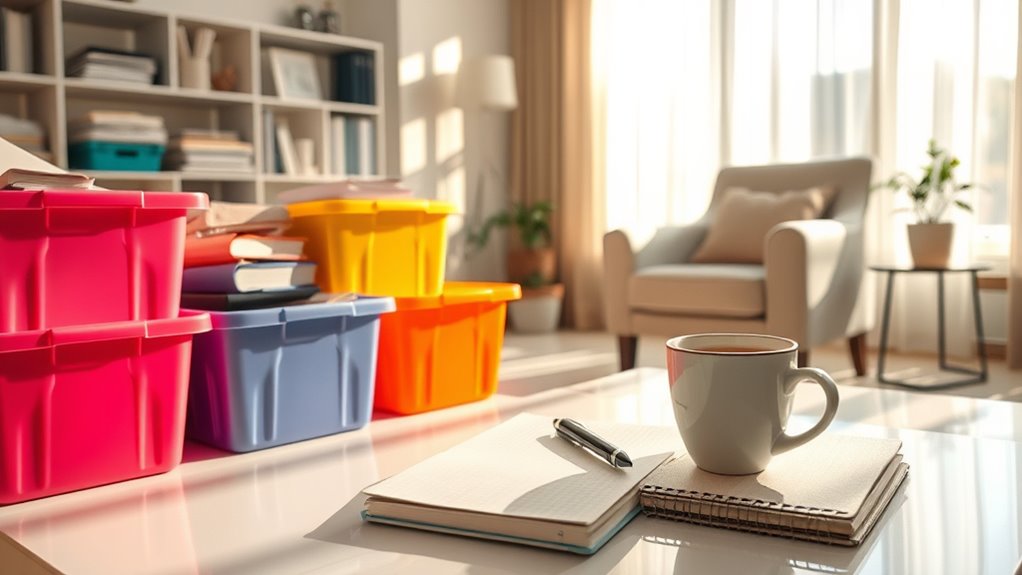
While embarking on your decluttering journey, it's crucial to set yourself up for success. Start by breaking down tasks into smaller, manageable chunks to avoid feeling overwhelmed. Focus on one room or area at a time, and don't forget to define clear objectives for each session. Gather essential tools like trash bags, donation boxes, and labels to streamline the process. To maintain your motivation, remember that a clutter-free space isn't just about tidiness—it's about crafting a life that feels calm, functional, and beautiful. Commit to a daily routine, even if it's just for 10 minutes, and visualize the benefits of a clutter-free space. Consider enlisting help from friends or family for added support. Lastly, celebrate small victories along the way to keep your motivation high. With these tips, you're well on your way to a successful decluttering journey! Decluttering reduces stress and boosts productivity, making the process even more rewarding.
Overcoming Common Challenges
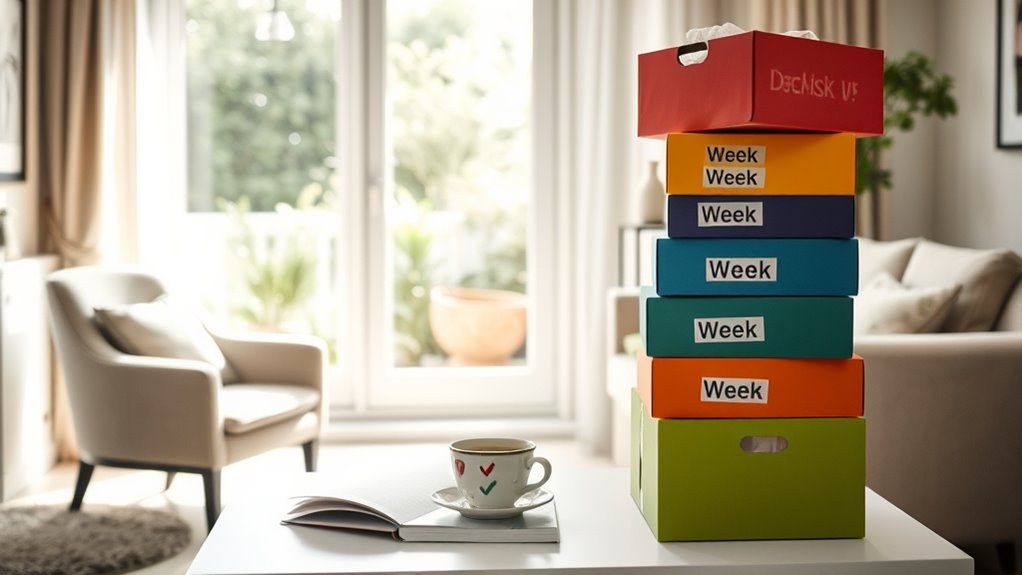
Decluttering can feel daunting, especially when faced with time constraints, emotional attachments, or a lack of motivation. To overcome time issues, start small—allocate just 10-20 minutes each day and treat those sessions like important appointments. Break tasks down into manageable chunks and involve family members to share the load to foster collaboration. For emotional attachments, shift your mindset to focus on the benefits of a clutter-free space. Use the one-year rule to decide what to keep and consider creating a memory box for sentimental items. If motivation wanes, gamify your decluttering by listening to music or rewarding yourself after each session.
The Importance of Tracking Progress
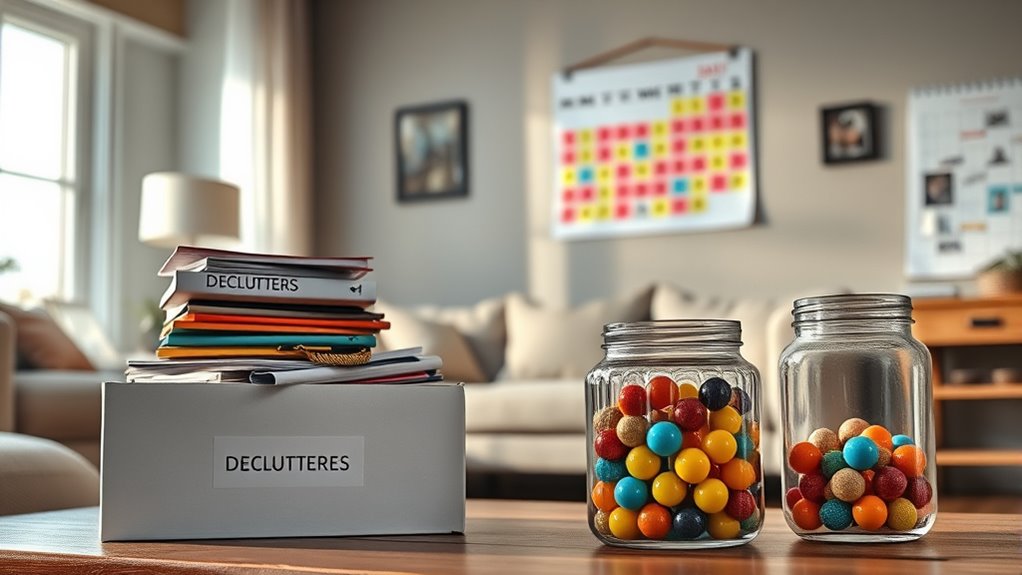
Tracking your progress in decluttering is crucial because it not only helps you stay motivated but also provides a clear picture of how far you've come. Setting specific decluttering goals allows you to measure your success effectively, whether it's clearing a room or tackling a cluttered corner. Consistent effort is key—focus on removing items instead of just shuffling them around. Using tools like printable calendars or decluttering apps can enhance your engagement and keep you on track. Clear goals help maintain focus and track progress, reinforcing your motivation and reducing stress. Celebrate small milestones to reinforce your motivation and reduce stress. Documenting your progress with before-and-after photos also serves as a powerful reminder of your achievements, ensuring you maintain the momentum throughout your decluttering journey.
Maintaining Your Organized Space After the Challenge
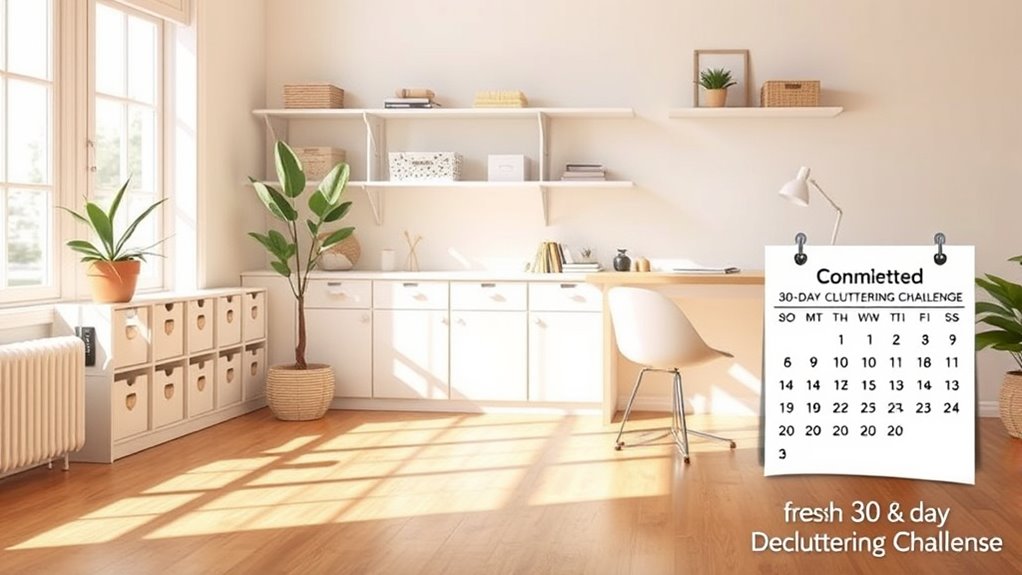
Once you've completed the decluttering challenge, it's crucial to establish habits that keep your organized space intact.
Set aside a few minutes each day to maintain your space, weaving cleaning tasks into your daily routine, like during commercial breaks. Daily maintenance practices can help reinforce organization habits over time. Implementing multi-functional furniture can also aid in maintaining a tidy environment while providing versatility in your space.
Involve your family by assigning tasks and creating a labeling system so everyone knows where items belong.
Group similar items together and use bins to keep everything organized and accessible.
Regularly check for clutter accumulation and designate a donation zone for items you no longer need.
Embrace empty spaces, ensuring flat surfaces stay clear.
The Impact of Decluttering on Mental Health
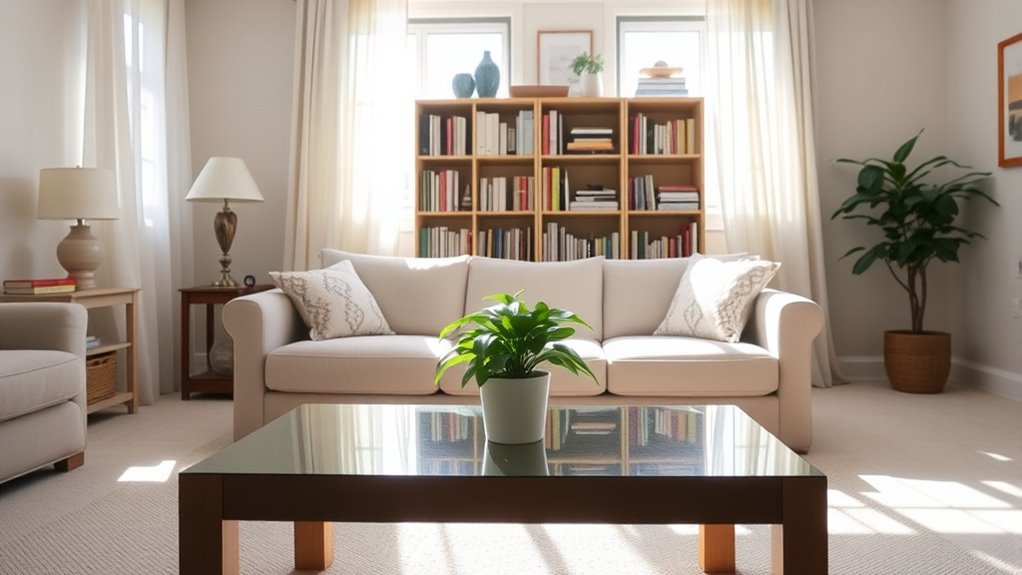
When you tackle clutter, you might be surprised by the profound impact it can have on your mental health. A chaotic environment often heightens stress and anxiety, but decluttering creates a peaceful space, reducing cortisol levels associated with stress.
You'll notice improved focus and productivity as you free yourself from distractions, allowing for better task completion. Additionally, the sense of accomplishment you gain from decluttering boosts your mood and self-esteem, while fostering creativity. Moreover, controlling clutter can lead to increased confidence and reduced anxiety, enhancing your overall emotional well-being.
You may even experience better sleep quality, as a tidy bedroom promotes relaxation and reduces visual chaos. Overall, decluttering enhances mental clarity and emotional well-being, helping you feel more in control and less overwhelmed in your daily life.
Celebrating Your Decluttering Achievements
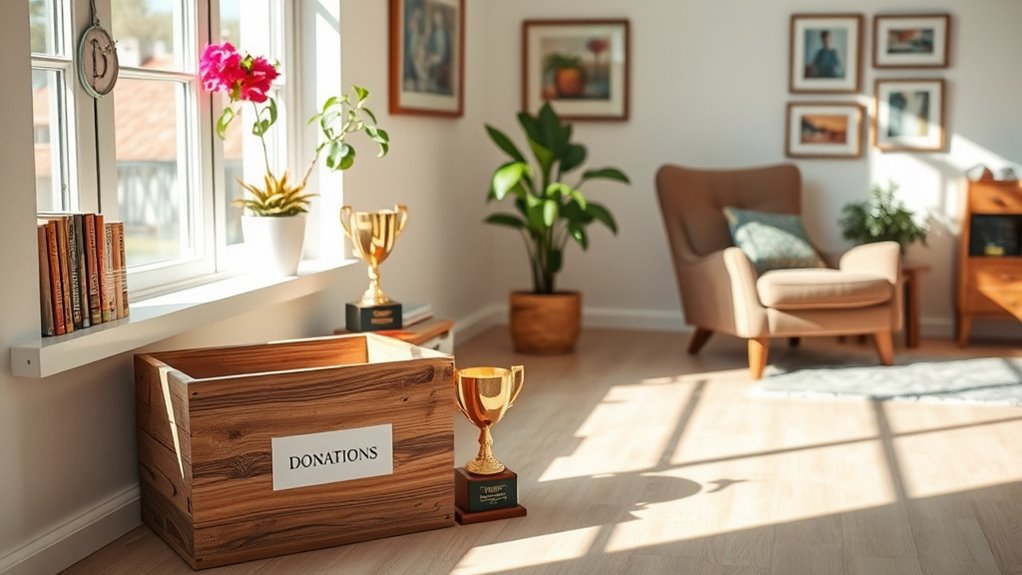
Decluttering not only improves your mental health but also opens the door to celebrating your achievements along the way. Recognizing your unique motivational style helps you appreciate what drives you to declutter. Celebrate each step, whether it's clearing a single drawer or completing a larger space. Acknowledge the creative solutions you've discovered, as they enhance your sense of accomplishment. Share your journey with friends or on social media to inspire others and foster community support. Capture your progress with before-and-after photos or a decluttering tracker, reinforcing your achievements visually. Finally, treat yourself for reaching milestones; these rewards keep you motivated and excited about your ongoing decluttering journey. Remember, acknowledging milestones along the way is crucial for maintaining enthusiasm and commitment to your goals. Celebrate each success, no matter how small!
Frequently Asked Questions
Can I Start the Challenge at Any Time?
Absolutely! You can start your decluttering challenge whenever it suits you.
There's no need to wait for the beginning of a month or a specific date. Just pick a day, gather your supplies, and dive in.
Whether you're tackling one area each day or adjusting tasks to fit your schedule, the key is to stay consistent.
Flexibility's your friend, so make it work for you and enjoy the process of clearing the clutter!
What Should I Do With the Items I Remove?
When you remove items, consider donating them to local charities or thrift stores like Goodwill.
You can also sell them online through platforms like eBay or Facebook Marketplace.
If you're feeling creative, try repurposing or upcycling the items into something new.
For items that aren't usable, make sure to recycle them properly or dispose of them through designated waste facilities.
This way, you're helping the environment while clearing out your space.
How Do I Handle Sentimental Items?
Handling sentimental items feels like trying to untangle a spider's web—each strand pulls at your heart.
Start by acknowledging your emotions; it's okay to feel nostalgic. Consider documenting the stories behind each item or take photos to preserve memories without the clutter.
Gradually set boundaries on what to keep. Remember, it's not about discarding your past; it's about making space for your present and future while cherishing the memories that truly matter.
Is It Okay to Skip Days if Needed?
Yes, it's perfectly okay to skip days if needed! Life can get busy, and taking a break helps you avoid burnout.
Focus on your overall progress rather than strict timelines. When you feel overwhelmed, prioritize your mental well-being. You can always catch up later or adjust your pace.
Can I Involve My Family in the Challenge?
Absolutely, you can involve your family in the challenge! By getting everyone on board, you'll encourage teamwork and make the process more fun.
Assign age-appropriate tasks to each family member, and turn decluttering into a game or competition to keep things engaging. Celebrate small victories together, and watch as everyone feels a sense of accomplishment.
It's a great way to bond while creating a more organized home!
Conclusion
As you wrap up your 30-day decluttering challenge, remember that like the phoenix rising from the ashes, you too can emerge renewed and revitalized. Embrace the clarity and space you've created, both physically and mentally. Each item you let go of is a step toward a lighter, more organized life. Keep the momentum going, and cherish the calm that comes with a tidy space. Celebrate your achievements, and let your journey inspire others to embark on their own transformation.
